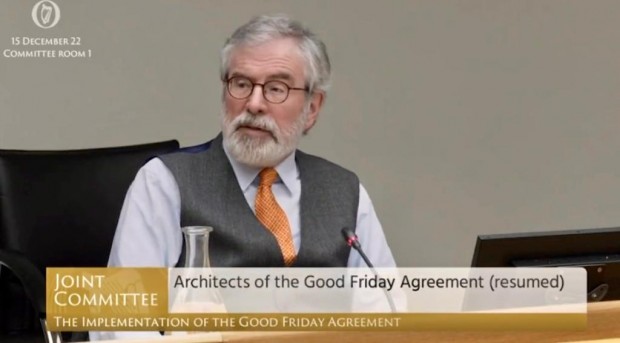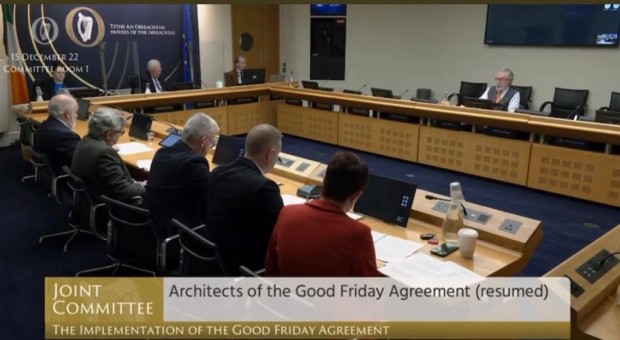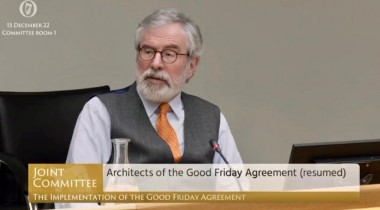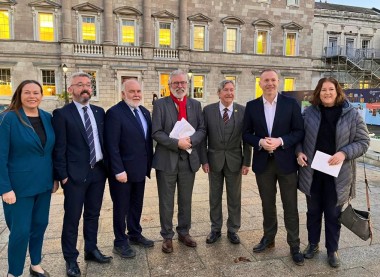18 December 2022
Gerry Adams addresses Oireachtas Good Friday Agreement Committee

I want to thank the Chair Teachta Dála Fergus O’Dowd and the Joint Committee on the Implementation of the Good Friday Agreement for the invitation to speak this afternoon.
I want to dedicate my remarks today to the family of Mayo Republican Tommy Devereaux and his wide Ann, to Orlaith and Oonagh and their teaghlach.
Comhgairdheas also to Ciaran and Orlaith Staunton and to their daughter Kathleen.
Ciaran and Orlaith were awarded the Presidential Distinguished Service Award for the Irish Abroad from President Michael D Higgins for their work on raising awareness around Sepsis following the death of their son Rory.
I don’t think it is putting it too strongly to describe the Good Friday Agreement as probably the most important political agreement of our time in Ireland.
When it was agreed George Mitchel told myself and Martin McGuinness that that was the easy bit.
The hard part was going to be implementing it, he said. And he was right.

- Gerry Adams addressed the Oireachtas Good Friday Agreement committee in Leinster House this week
The twists and turns from April 10th 1998 to now have been many.
Currently the institutions are not in place due to the intransigence of the DUP, the machinations of successive Tory governments and unionist efforts to force the EU and Irish government to scrap the protocol.
However, despite these difficulties the success of the Agreement is that there are many people alive today because of it.
It brought an end to almost three decades of war.
It is seen by many internationally as an example of how deep rooted conflicts can be resolved.
Those who still seek to use violence or threaten the use of violence represent the past.
So do the securocrats who manipulate the groups involved.
They should end their actions and go away.
Of course, the Good Friday Agreement isn’t a perfect agreement. It was after all a compromise between conflicting political positions after decades of violence and generations of division.
It is also a fact that crucial elements of the Agreement have still not been implemented by the British and Irish governments, including a Bill of Rights for the North; the Civic Forum; a Charter of Rights for the island of Ireland and the British government’s refusal to honour its Weston Park commitment to establish an inquiry into the murder of human rights lawyer Pat Finucane.
Likewise the British government’s refusal to fulfil its commitments and obligations to deal with the legacy of the past and the concerns of families bereaved during the conflict.
The Tory government has no real investment in the Good Friday Agreement.
In fact, its policy is to emasculate the human rights elements of the Agreement.
Nonetheless, the new dispensation ushered in by the Agreement has replaced the years of violence which preceded it.
It is important to remind ourselves that earlier initiatives - political and military – on the part of the British government and often supported by the Irish government - failed to bring peace because they were not inclusive.
They consciously failed to address the causes of conflict.
Rather than tackling exclusion, censorship, discrimination and repression, they entrenched these injustices and, in so doing, deepened and perpetuated conflict.

- "At a time when debate on constitutional change is dominating much of our politics and opinion polls are being produced regularly, it makes no sense not to plan - not to prepare for the Unity referendums" - Gerry Adams
Previous efforts by the Irish and British governments – from Sunningdale in December 1973 through to the Anglo-Irish Agreement in 1985 and the Downing Street Declaration in 1993 – were about defending and protecting the status quo.
They were about stabilising and pacifying rather than about removing the injustice that was driving political dissent and resistance.
The policies of both governments sought to criminalise and marginalise Irish republicans.
The British state’s counter insurgency strategy also relied heavily on state sponsored collusion with unionist death squads.
None of this worked.
On the contrary, it made the task of peace building more difficult. It led to an entrenchment of conflict.
Peace building requires a different approach.
Peace is not simply about ending conflict.
It has to tackle the causes of conflict.
Peace must therefore mean justice.
The work of the late Fr. Des Wilson and Fr. Alec Reid was central to this endeavour.
Sinn Féin also came to understand the importance of the international dimension.
We began to explore that area of work – most successfully in the USA and South Africa.
At that time, the British government was resisting any scrutiny of what was happening in the North.
The British government insisted that these issues were an internal matter “for the government of the UK.”
The Irish government had no consistent strategy to contest this.
As Sinn Féin increased our electoral mandate, rather than addressing the core issues that were driving conflict, policies were developed to subvert and set aside the rights of republican voters.
This was, of course, entirely counter-productive.
A key part of our focus therefore was about turning the governments away from their disastrous, undemocratic and deeply flawed policy of refusing to talk to Sinn Féin.
Sinn Féin argued in Scenario for Peace in 1987; in our talks with the SDLP in 1988, in Towards a Lasting Peace in Ireland in 1992 and in my joint statements with John Hume and in the Hume-Adams Agreement that inclusive dialogue was essential for building peace.
John Hume was pilloried and vilified and condemned by governments and most of the political parties, and by large sections of the media, for daring to talk to me.
Thankfully John refused to succumb to that pressure. Imagine where we would all be today if they had had their way.
Sinn Féin had also begun the slow process of talking to others, occasionally publicly but often privately, secretly.
This was especially the case when dealing with the British and Irish governments.
The dialogue between John Hume and myself was probably the clearest example of this developing alternative strategy.
It certainly generated enormous public attention, most of it negative, as the establishment in Britain and Ireland pushed back against any new approach.
But others were starting to listen and talk to Sinn Féin and to acknowledge the rights of our electorate.

- (L-R: Louise O'Reilly TD, Senator Niall Ó Donnghaile, Francie Molloy MP, Gerry Adams, Mickey Brady MP, Chris Hazzard MP, Lucilita Breathnach)
Taoisigh Charles Haughey, Albert Reynolds and then Bertie Ahern authorised and then facilitated a dialogue with the Sinn Féin leadership.
Bill Clinton listened to Irish American voices and broke with the pro-British agenda that had been followed by successive US administrations.
And the British Prime Minister Tony Blair also recognised the need to talk and to listen.
These key leadership figures were critical to ending the failed approaches of the past and in developing a new approach based on dialogue and on inclusion.
The process also involved republicans taking significant initiatives and risks to create momentum in the process or to end crises.
All of this took many years of hard work, too many years but in the end, collectively, we succeeded in building a conflict resolution process that, for all of its imperfection, has become a model for peace building
The negotiations which commenced in September 1997 and led to the Good Friday Agreement were based on this new and different approach grounded in inclusion, equality and democracy.
As Jonathan Powell remarked in his contribution to the Committee in June the “crucial point about the Good Friday negotiations was making them inclusive.” That is the key to its success.
The Sinn Féin leadership went into the negotiations knowing we would not achieve all of our objectives given our political strength at that time.
However, we had our own red line issues.
For example; we had already decided to compromise on the need for a single unity referendum by holding two referendums North and South on the same day.
Our leadership decided that the policing and justice issues should be dealt with in a separate negotiation – the RUC had to go.
In our view a Commission could best deal with this issue.
One of our key objectives was to get rid of the Government of Ireland Act. I am pleased that we succeeded.
The issue of equality had to be imbedded in the agreement;
As a result measures were put in place to achieve this and the Agreement correctly refers to equality 21 times in sharp contrast to the Sunningdale Agreement where it is not mentioned at all.
Then crucially, there is the issue of consent.
Previously this was interpreted as referring specifically to the consent of the unionist majority defined in Article 4 of the Sunningdale Agreement as “represented by the Unionist and Alliance delegations.”
The Good Friday Agreement is clear.
Constitutional change requires the consent of a majority.
This is the democratic position.
Of course, the sensible goal for all democrats must be to persuade the largest number of people to vote YES.
That is obvious and common sense.
Finally, it is important to understand that the Good Friday Agreement is not a settlement. It never was. It doesn’t pretend to be.
It is an agreement to a journey without agreement on the destination.
The promise of the Agreement is for a new society in which all citizens are respected; where the failed policies of the past are addressed;and where justice, equality and democracy are the guiding principles.
It also provides for the first time a peaceful democratic pathway to achieving Irish independence and unity.
This was crucial and central to the decade’s long effort to provide an alternative to armed struggle as a means to advance these legitimate goals.
From a Sinn Féin perspective, the efforts to reach that position involved prolonged engagements with John Hume, back channel communications with successive British governments, with Fianna Fáil led administrations, ongoing outreach to Irish America, and subsequently the White House, as well as attempts to outreach to elements of unionist and loyalist opinion.
No Irish government has ever produced a strategy to build a new and inclusive Ireland and give effect to Irish unity.
Now there is a mechanism to achieve this. The absence of Irish government planning is indefensible and incredibly short-sighted.
There is no excuse for this.
What is needed is the full implementation of the Good Friday Agreement, including setting a date and planning for the referendum on the future.
This requires inclusive discussions about the future to ensure that not only do citizens take informed decisions but that the new Ireland which emerges when the Union ends is one in which everyone is valued and social and economic rights are upheld.
The Irish government should establish a Citizen’s Assembly or series of such Assemblies to discuss the process of constitutional change and the measures needed to build an all-Ireland economy, a truly national health service and education system and much more.
This makes sense.
Very few countries get a chance to begin anew.
Ireland, North and South, has that chance.
Most leaders would embrace this, welcome it and be excited by that prospect.
Most leaders with a vision for the future would carefully and diligently seize this opportunity.
But not here.
Political parties which have enjoyed being in power in this state since partition don’t wish to give up that power.
That’s why our outgoing Taoiseach Micheál Martin refuses to establish a Citizen’s Assembly to plan the future -an inclusive, citizens centred, rights based society of equals.
It is certainly Sinn Féin’s desire to encourage and help create such a new departure for all the people of our island.
It’s all about democracy.
The people should decide.
At a time when the debate on constitutional change is dominating much of our politics and opinion polls are being produced regularly, it makes no sense not to plan – not to prepare for the unity referendums.
The Irish government has a responsibility to prepare for constitutional change.
The government and the rest of us need to be totally committed to upholding and promoting the rights of our unionist neighbours – this includes the rights of the Orange Order and other loyal institutions.
The protections in the Good Friday Agreement are their protections also.
This is their land, their home place.
There needs to be a clear commitment by the rest of us to upholding their rights and to working with them to make this a better place for everyone.
As Martin McGuinness said:
“I am so confident in my Irishness that I have no desire to chip away at the Britishness of my neighbours.”
Surely the new Ireland planned and built by all of the people of the island can accommodate and celebrate our differences and diversity.
Irish Unity will profoundly transform the political landscape.
A new multicultural society, embracing and respecting all traditions will emerge.
At the core of the progress we have already made is dialogue.
Dialogue - talking and listening to each other - is the key to resolving conflict.
Dialogue is key to building an inclusive society.
Yes, there will be many challenges but there will also be many opportunities.
I look forward to the future with hope and optimism.
Follow us on Facebook
An Phoblacht on Twitter
Uncomfortable Conversations

An initiative for dialogue
for reconciliation
— — — — — — —
Contributions from key figures in the churches, academia and wider civic society as well as senior republican figures





